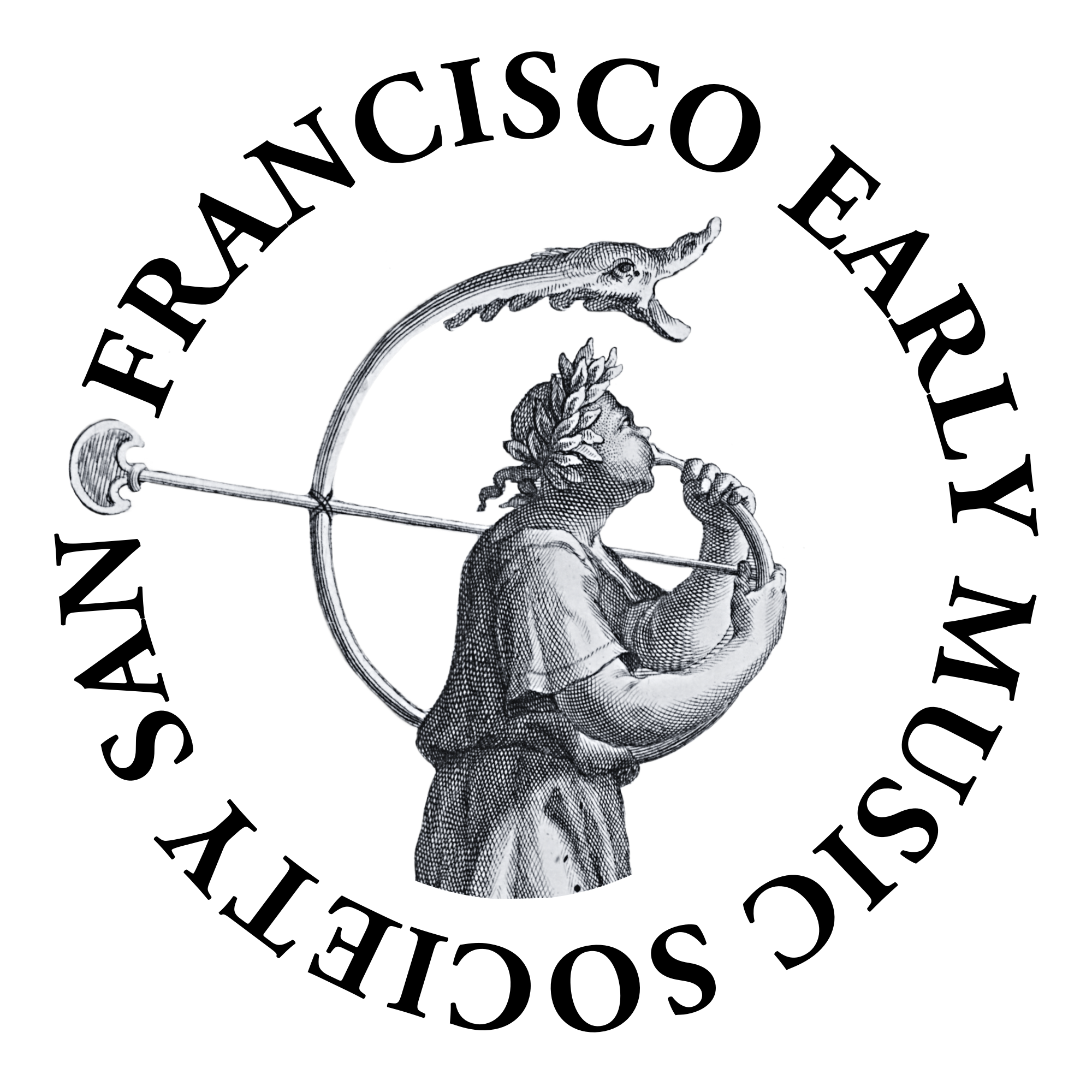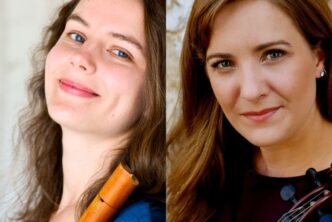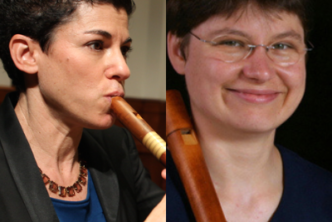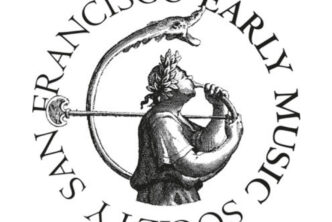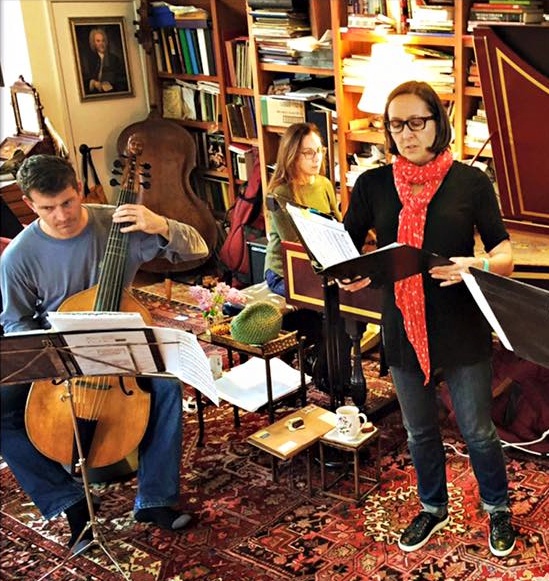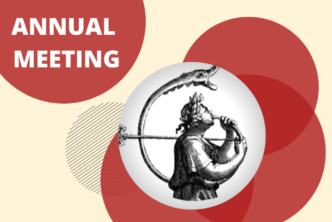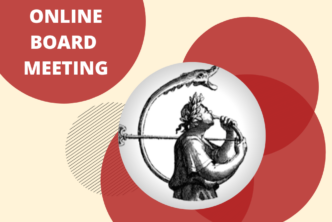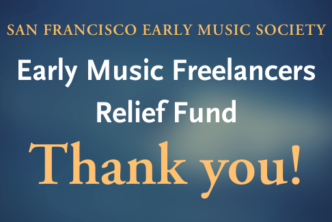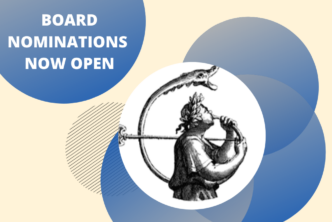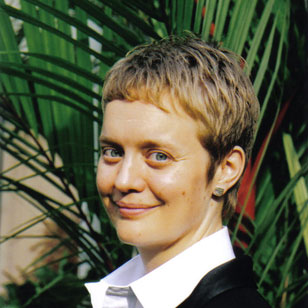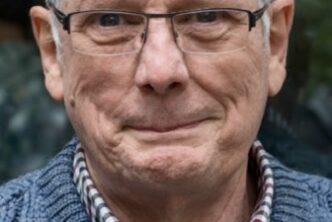SFEMS 2017–18 Series: Notes for Changing Times
The SFEMS 2017–18 concert series now is posted at our website, and when you check it out we think you will be delighted as we are at the variety and depth of the coming season’s offerings. It is hard to recall a recent SFEMS series broader or better balanced in terms of historical epoch, featured instrumentation, and representation of artists, including newer and more distinguished, regional, national, and international performers.
If there is any overarching theme one can see in this season’s presentations, it is perhaps the idea of transformation—from the changing of seasons to great shifts of taste, belief, or technology to the disruptions of war and revolution. Western music has had its acknowledged watershed events, but its soundworld also inhabits a larger social world whose changing realities it always has engaged. This season our artists explore some important and intriguing moments of social and musical transformation over 7 centuries, from the Middle Ages to the eve of the Classical era: we will look at the upheavals of the Reformation and the 30 Years War; the pregnant interval at the end of the baroque era, when the rules of Classical composition had not yet been written; and the apotheosis of two arcane instruments on the eve of their dissolution. Throughout history, in times of change and uncertainty, music always has responded and interpreted—its record sometimes written in anguish, sometimes for hope, to comfort, in contemplation, or with celebration.
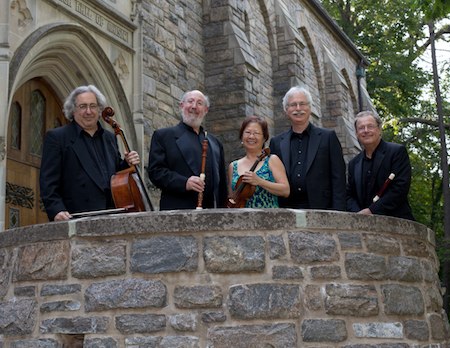 The 2017–18 series opens the weekend of October 20–22 with “Handel and His World,” a program by the venerable Aulos Ensemble (Christopher Krueger, flauto traverso and recorder; Marc Schachman, baroque oboe; Linda Quan, baroque violin; Myron Lutzke, baroque cello; Arthur Haas, harpsichord), featuring music by Purcell, Handel, and Telemann. Handel was both an admirer of Henry Purcell and a lifelong friend and correspondent with Georg Philipp Telemann. Aulos’s program will spotlight the connections among these three great composers in a rich and diverse a program covering 4 decades of compelling music, including the group’s own Suite from The Fairy Queen, two of Telemann’s inspired quartets, and a great deal of Handel’s fine chamber music for three and four voices.
The 2017–18 series opens the weekend of October 20–22 with “Handel and His World,” a program by the venerable Aulos Ensemble (Christopher Krueger, flauto traverso and recorder; Marc Schachman, baroque oboe; Linda Quan, baroque violin; Myron Lutzke, baroque cello; Arthur Haas, harpsichord), featuring music by Purcell, Handel, and Telemann. Handel was both an admirer of Henry Purcell and a lifelong friend and correspondent with Georg Philipp Telemann. Aulos’s program will spotlight the connections among these three great composers in a rich and diverse a program covering 4 decades of compelling music, including the group’s own Suite from The Fairy Queen, two of Telemann’s inspired quartets, and a great deal of Handel’s fine chamber music for three and four voices.
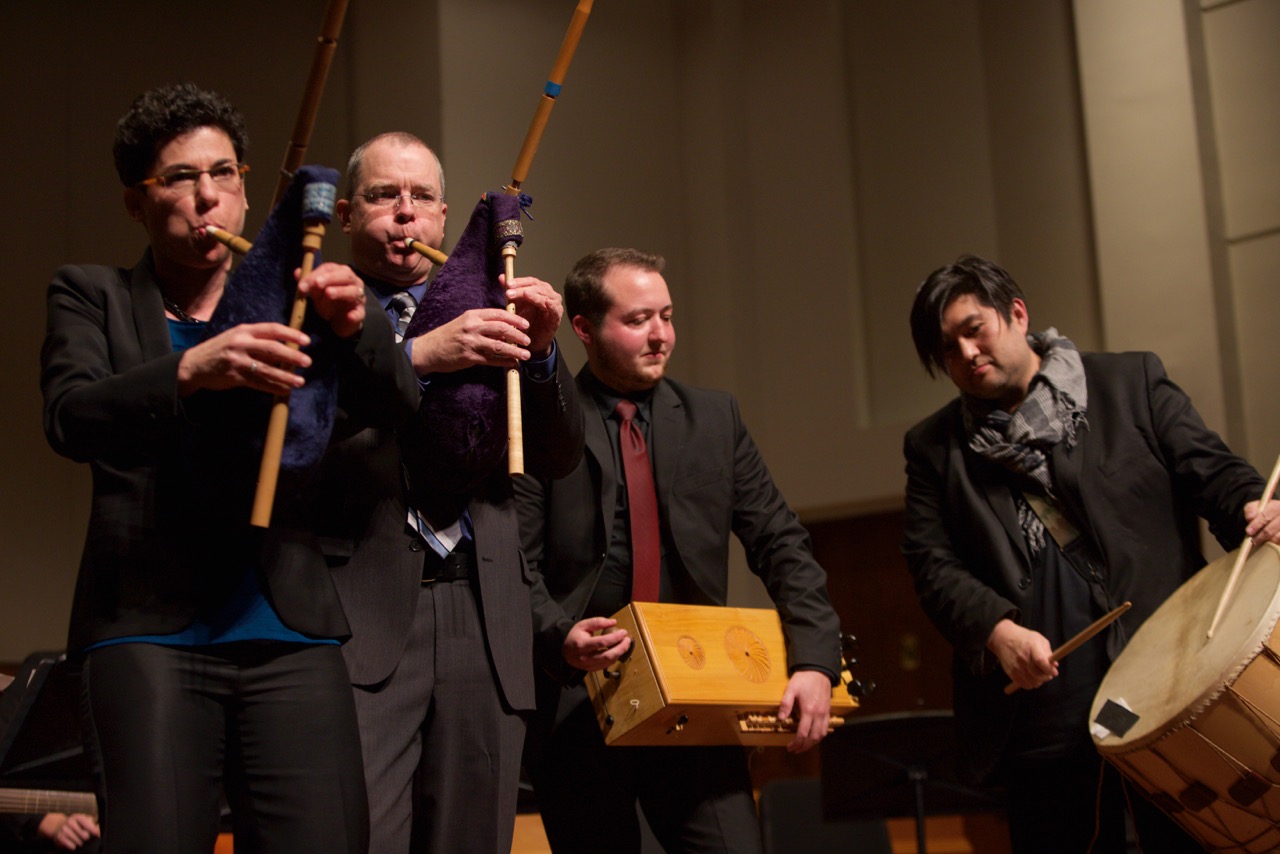 The weekend of November 17–19, we welcome back our favorite shawm Big Band, Ciaramella (Adam Gilbert, shawm, recorder & bagpipe; Rotem Gilbert, shawm, recorder & bagpipe; Malachai Komanoff Bandy, shawm, viola da gamba, hurdy-gurdy & bagpipe; Adam Bregman, sackbut & recorder; Aki Nishiguchi, shawm & recorder; Jason Yoshida, lute, guitar & percussion), who will take us back to the 1517, or thereabouts, to sample “German Music Before and After the Reformation.” A watershed year, 1517 marked the beginning of the Protestant Reformation, as well as Heinrich Isaac’s death. Ciaramella’s concert—performed on the group’s typically colorful consort—features songs of love, lust, and devotion from the Lochamer Liederbuch, the Schedel Liederbuch, the Glogauer Liederbuch, the Songbook of Anna of Cologne, and the Kodex Leopold. The program includes works of Isaac, Paul Hofhaimer, and Ludwig Senfl, topped off with popular dances collected and arranged by Michael Praetorius.
The weekend of November 17–19, we welcome back our favorite shawm Big Band, Ciaramella (Adam Gilbert, shawm, recorder & bagpipe; Rotem Gilbert, shawm, recorder & bagpipe; Malachai Komanoff Bandy, shawm, viola da gamba, hurdy-gurdy & bagpipe; Adam Bregman, sackbut & recorder; Aki Nishiguchi, shawm & recorder; Jason Yoshida, lute, guitar & percussion), who will take us back to the 1517, or thereabouts, to sample “German Music Before and After the Reformation.” A watershed year, 1517 marked the beginning of the Protestant Reformation, as well as Heinrich Isaac’s death. Ciaramella’s concert—performed on the group’s typically colorful consort—features songs of love, lust, and devotion from the Lochamer Liederbuch, the Schedel Liederbuch, the Glogauer Liederbuch, the Songbook of Anna of Cologne, and the Kodex Leopold. The program includes works of Isaac, Paul Hofhaimer, and Ludwig Senfl, topped off with popular dances collected and arranged by Michael Praetorius.
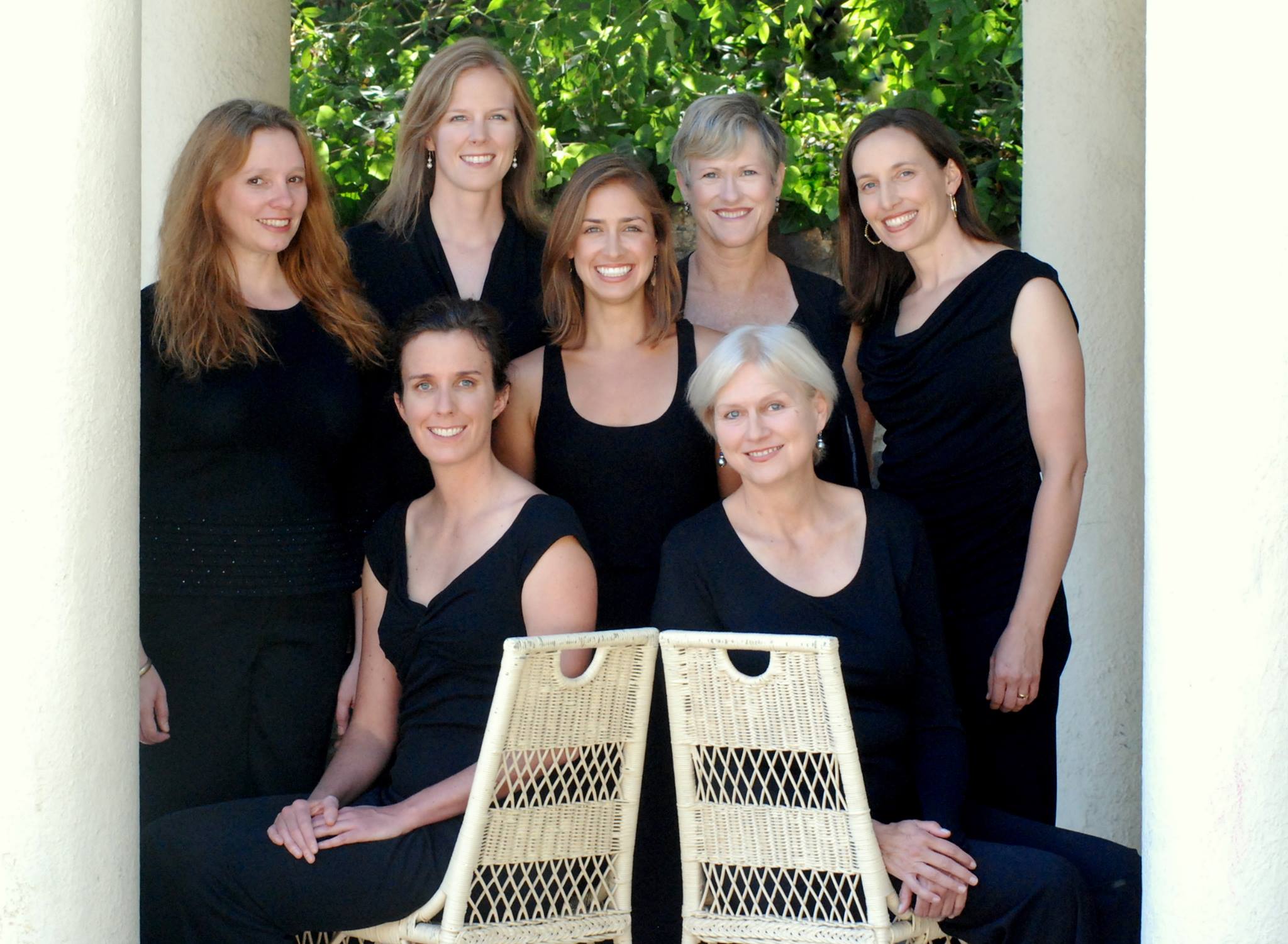 The series takes a break during December—competition for venue space was absurd—but we have embraced the fine, European tradition of keeping the midwinter festivities alive into the New Year. So on January 5, 6, and 7, Vajra Voices (Karen Clark, Director; Allison Zelles Lloyd, Amy Stuart Hunn, Cheryl Moore, Lindsey McLennan Burdick, Cecilia Lam, and Celeste Winant, with Shira Kammen, vielle & harp; and Kit Higginson, recorder, psaltery & jongleur), will treat us to a festive program of “Medieval Poetry, Music & Magic to Ring in the New Year.” The “elegant, full-blooded” singing of Vajra Voices and zesty, vibrant harp and vielle playing of Shira Kammen join together with the recorder, psaltery, and magic of Kit Higginson to illuminate the mystery and wonder of the new year. This program boasts medieval, florid chant, luscious French motets, and chansons of Dufay, such as Bon Jour, bon mois, bon an; and beautiful Middle English poems told in enchanting settings and enhanced by a bit of mystery. Join this celebration of new beginnings that hearkens back to the magic of Winter’s light. Festive attire is suggested.
The series takes a break during December—competition for venue space was absurd—but we have embraced the fine, European tradition of keeping the midwinter festivities alive into the New Year. So on January 5, 6, and 7, Vajra Voices (Karen Clark, Director; Allison Zelles Lloyd, Amy Stuart Hunn, Cheryl Moore, Lindsey McLennan Burdick, Cecilia Lam, and Celeste Winant, with Shira Kammen, vielle & harp; and Kit Higginson, recorder, psaltery & jongleur), will treat us to a festive program of “Medieval Poetry, Music & Magic to Ring in the New Year.” The “elegant, full-blooded” singing of Vajra Voices and zesty, vibrant harp and vielle playing of Shira Kammen join together with the recorder, psaltery, and magic of Kit Higginson to illuminate the mystery and wonder of the new year. This program boasts medieval, florid chant, luscious French motets, and chansons of Dufay, such as Bon Jour, bon mois, bon an; and beautiful Middle English poems told in enchanting settings and enhanced by a bit of mystery. Join this celebration of new beginnings that hearkens back to the magic of Winter’s light. Festive attire is suggested.
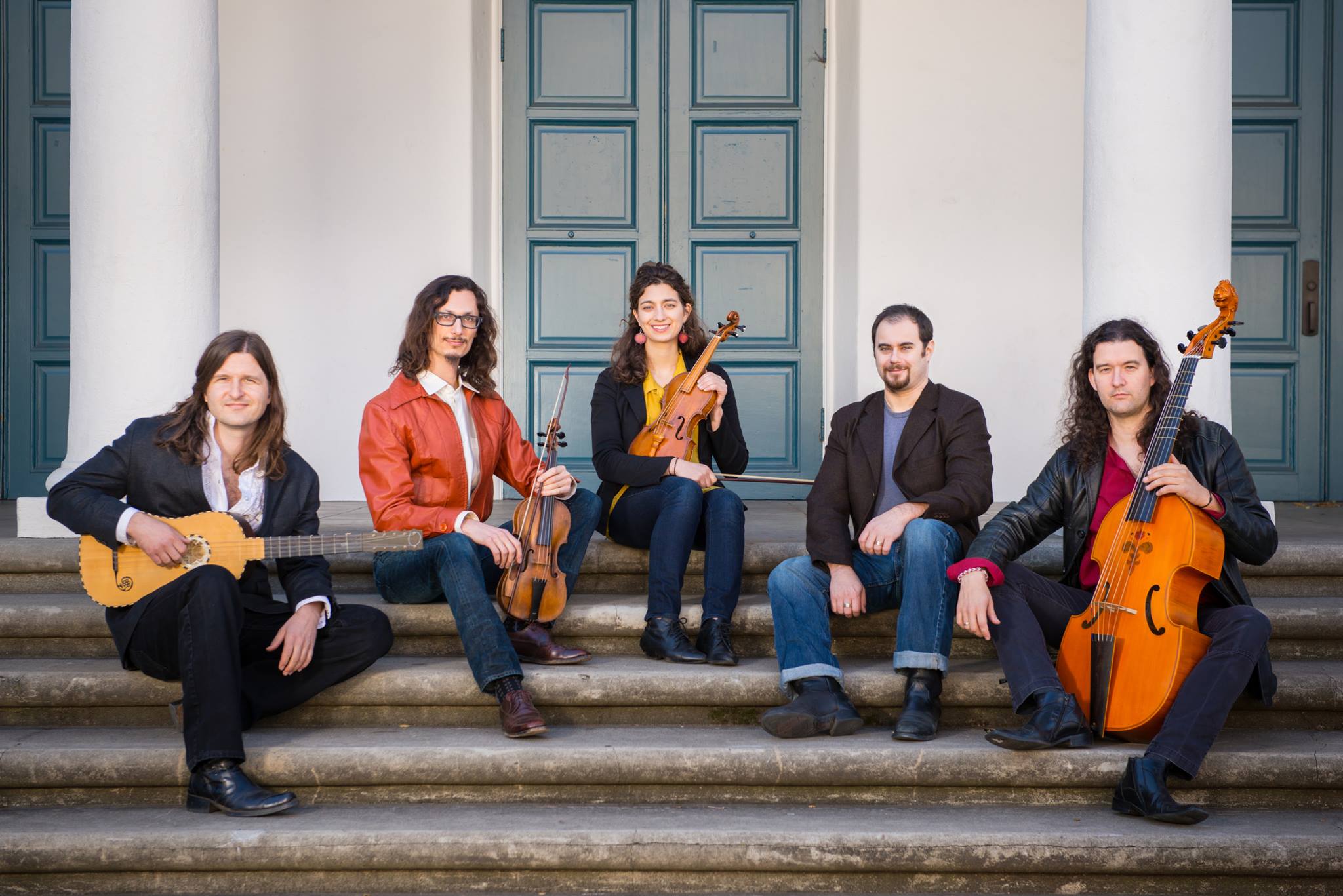 Agave Baroque with countertenor Reginald Mobley will have our attention the week of February 2–4. This fine, young ensemble (Aaron Westman, Natalie Carducci, violins; William Skeen, cello & viola da gamba; Kevin Cooper, guitar and theorbo; Henry Lebedinsky, harpsichord and organ) will perform a concert focusing on music of the Thirty Years War and its aftermath. The year 2018 marks the 400th anniversary of this terrible war’s beginning—one of the most destructive conflicts in European history. Agave’s program, “Peace in Our Time,” explores the Stylus fantasticus, a new compositional emphasis on the range and depth of human that arose in aftermath of that war. From the heart wrenching sorrow of Johann Christoph Bach’s Ach, dass ich Wassers gnug hätte to a yearning for a better day to come in Pohle’s Herr, wenn ich nur dich habe, we glimpse the emotions of those affected by that terrible conflict. Yet even in those uncertain and dark times, we find hope and joy in the celebratory music of Pachelbel and the Bach family.
Agave Baroque with countertenor Reginald Mobley will have our attention the week of February 2–4. This fine, young ensemble (Aaron Westman, Natalie Carducci, violins; William Skeen, cello & viola da gamba; Kevin Cooper, guitar and theorbo; Henry Lebedinsky, harpsichord and organ) will perform a concert focusing on music of the Thirty Years War and its aftermath. The year 2018 marks the 400th anniversary of this terrible war’s beginning—one of the most destructive conflicts in European history. Agave’s program, “Peace in Our Time,” explores the Stylus fantasticus, a new compositional emphasis on the range and depth of human that arose in aftermath of that war. From the heart wrenching sorrow of Johann Christoph Bach’s Ach, dass ich Wassers gnug hätte to a yearning for a better day to come in Pohle’s Herr, wenn ich nur dich habe, we glimpse the emotions of those affected by that terrible conflict. Yet even in those uncertain and dark times, we find hope and joy in the celebratory music of Pachelbel and the Bach family.
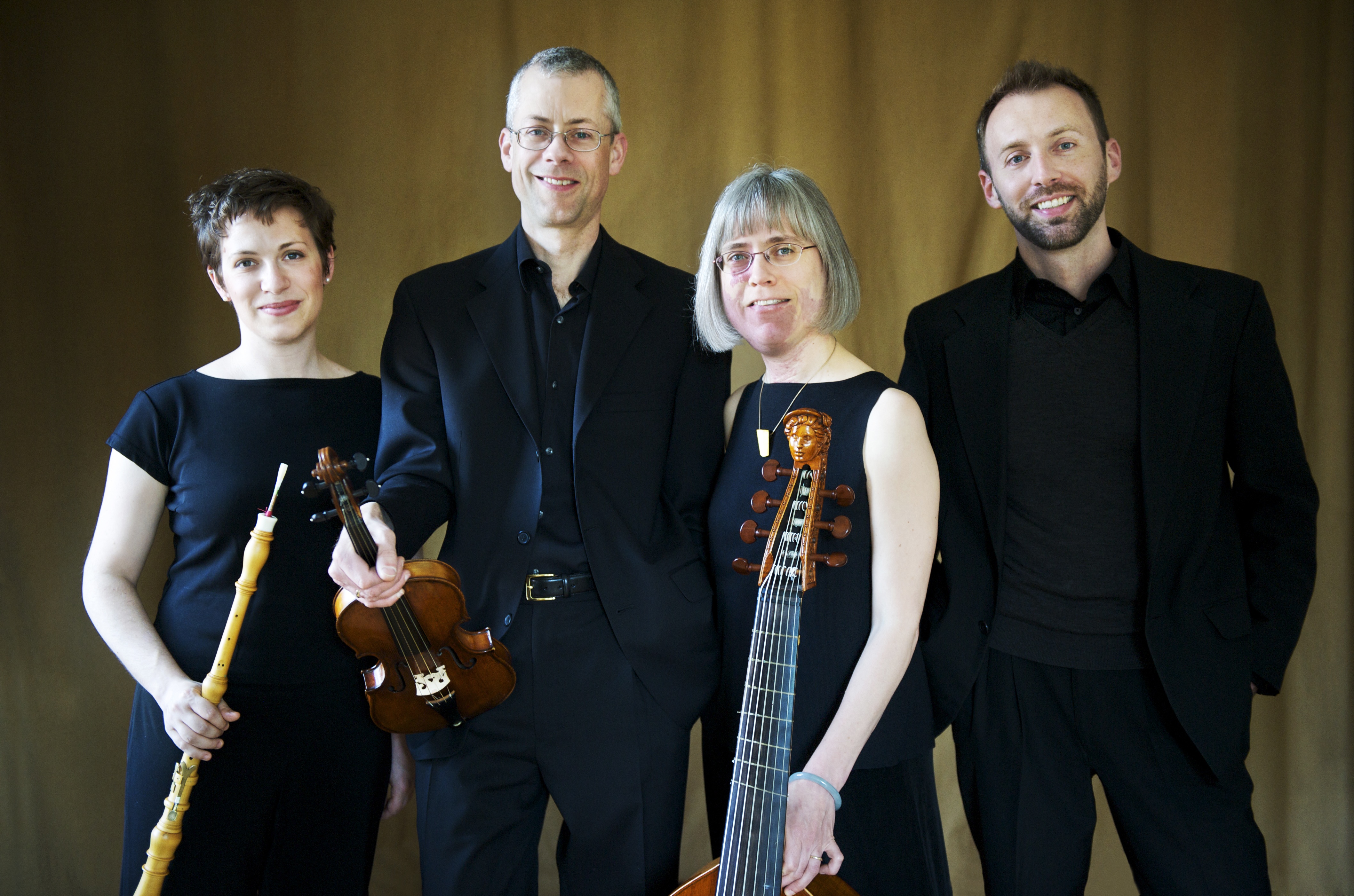 A month later, the weekend of March 2–4, we will be treated to the delights of Les Délices (Debra Nagy, baroque oboe; Julie Andrijeski and Adriane Post, baroque violin; Emily Walhout, viola da gamba; Mark Edwards, harpsichord) whose program, the “Age of Indulgence,” explores the “unique music from the eve of an aesthetic revolution.” These daring, experimental, French Rococo pieces from the 1740s and 1750s don’t conform to our expectations about baroque music, but they’re not quite Classical either. Rather, they mix the humor and wit of early Haydn and Gluck, a little of C.P.E. Bach’s Sturm und Drang, and characteristically lush French harmonies together to create a distinct sound. We will hear works by François-André Philidor, Jean-Philippe Rameau, and more.
A month later, the weekend of March 2–4, we will be treated to the delights of Les Délices (Debra Nagy, baroque oboe; Julie Andrijeski and Adriane Post, baroque violin; Emily Walhout, viola da gamba; Mark Edwards, harpsichord) whose program, the “Age of Indulgence,” explores the “unique music from the eve of an aesthetic revolution.” These daring, experimental, French Rococo pieces from the 1740s and 1750s don’t conform to our expectations about baroque music, but they’re not quite Classical either. Rather, they mix the humor and wit of early Haydn and Gluck, a little of C.P.E. Bach’s Sturm und Drang, and characteristically lush French harmonies together to create a distinct sound. We will hear works by François-André Philidor, Jean-Philippe Rameau, and more.
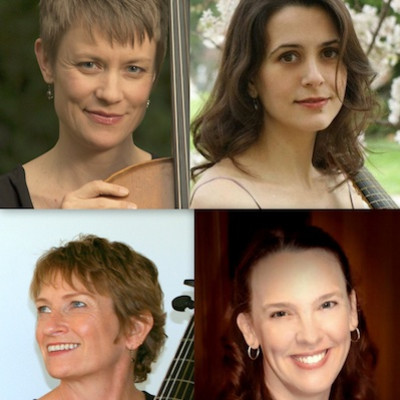 The regular series concludes the weekend of April 6–8, with the return of Wildcat Viols (Joanna Blendulf, Julie Jeffrey, Annalisa Pappano, and Elisabeth Reed). “The Magnifick Consort of Four Parts” will feature fantasies, suites and sonatas for viol quartet by Henry Purcell, Matthew Locke, and Giovanni Legrenzi. The second half of the 17th century witnessed the rise of violin-dominated chamber and orchestral genres, but the viola da gamba continued to inspire some of the most profound and astonishing music of early baroque, inviting the some of the era’s finest composers to write some of most daring and unusual musical ideas for the intimately passionate sound-world of the viol ensemble. Wildcat’s program features masterworks by Purcell, Locke, and Legrenzi—exquisite, lively, and intense music whose kaleidoscopic variety of colors and moods Wildcat Viols explores with fearless depth and sensitivity.
The regular series concludes the weekend of April 6–8, with the return of Wildcat Viols (Joanna Blendulf, Julie Jeffrey, Annalisa Pappano, and Elisabeth Reed). “The Magnifick Consort of Four Parts” will feature fantasies, suites and sonatas for viol quartet by Henry Purcell, Matthew Locke, and Giovanni Legrenzi. The second half of the 17th century witnessed the rise of violin-dominated chamber and orchestral genres, but the viola da gamba continued to inspire some of the most profound and astonishing music of early baroque, inviting the some of the era’s finest composers to write some of most daring and unusual musical ideas for the intimately passionate sound-world of the viol ensemble. Wildcat’s program features masterworks by Purcell, Locke, and Legrenzi—exquisite, lively, and intense music whose kaleidoscopic variety of colors and moods Wildcat Viols explores with fearless depth and sensitivity.
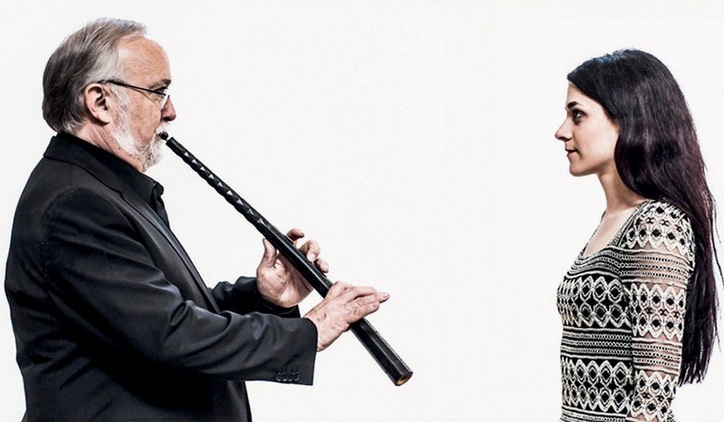 That is not quite the end of our season, however, since 2018 is a Berkeley Festival year (about which more later,… heh-heh). As we did with the British vocal group Stile Antico in 2016, SFEMS is adding a 7th, special, pre-Festival concert next spring. This year’s event, though, will be presented at all of our locations (the Palo Alto performance will be a co-presentation of Stanford Live and will take place at their venue). What a remarkable concert it will be. Aptly named “Breathtaking,” this stunning program will spotlight soprano Hana Blažíková’s angelic voice entwined with the supernaturally beautiful sound of Bruce Dickey’s cornetto. They will be joined by an all-star band, including Ingrid Matthews, violin & viol; Tekla Cunningham, violin; Michael Sponseller, organ & harpsichord; and Stephen Stubbs, theorbo & guitar. The cornetto was praised as the instrument closest to the human voice, and ensembles of the late Renaissance and early baroque often mixed cornetti with singers. The program explores the unique possibilities of this combination, with both early 17th-century motets and madrigals for voice and cornetto, as well as some rare, late 17th-century arias from operas and oratorios with obbligato parts written explicitly for the instrument.
That is not quite the end of our season, however, since 2018 is a Berkeley Festival year (about which more later,… heh-heh). As we did with the British vocal group Stile Antico in 2016, SFEMS is adding a 7th, special, pre-Festival concert next spring. This year’s event, though, will be presented at all of our locations (the Palo Alto performance will be a co-presentation of Stanford Live and will take place at their venue). What a remarkable concert it will be. Aptly named “Breathtaking,” this stunning program will spotlight soprano Hana Blažíková’s angelic voice entwined with the supernaturally beautiful sound of Bruce Dickey’s cornetto. They will be joined by an all-star band, including Ingrid Matthews, violin & viol; Tekla Cunningham, violin; Michael Sponseller, organ & harpsichord; and Stephen Stubbs, theorbo & guitar. The cornetto was praised as the instrument closest to the human voice, and ensembles of the late Renaissance and early baroque often mixed cornetti with singers. The program explores the unique possibilities of this combination, with both early 17th-century motets and madrigals for voice and cornetto, as well as some rare, late 17th-century arias from operas and oratorios with obbligato parts written explicitly for the instrument.
Events for the 2017–18 series are currently only available on subscription. The best seats in the house are being held for new and returning 2016–17 season subscribers until May 19th. Subscribe today and reserve your seats for 6 great early music programs. Subscribers also can purchase preferred tickets for our special Pre-Berkeley Festival Event—“Breathtaking” with Bruce Dickey and Hana Blažíková—at a savings of as much as 33%. Individual concert tickets go on sale May 20th.
CLICK HERE to download the printable PDF order subscription form.
Buy Tickets
Call the box office at 510-528-1725 or email us <tickets@sfems.org>.

